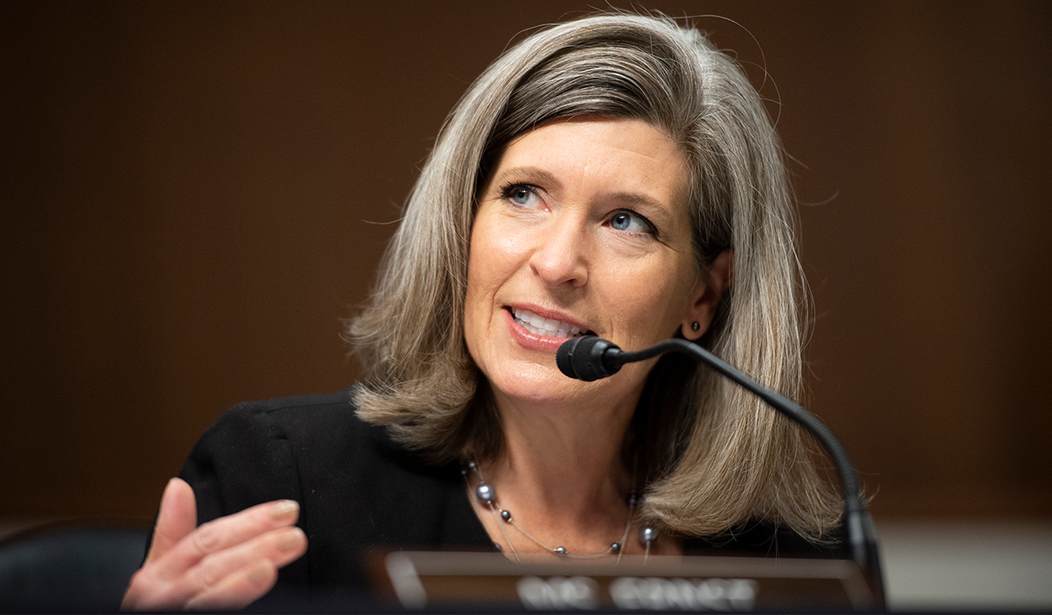'Tis the season in the U.S. Senate, or at least Senator Joni Ernst's office, as the Iowa Republican rolls out her 2023 "Naughty List of No-Shows" documenting the federal agencies with the lowest occupancy rates due to workforces still being MIA from their offices as COVID-era remote work allowances remain in effect.
Rolled out at a press conference on Tuesday afternoon, Ernst's list is topped by Housing and Urban Development and the Social Security Administration — both with just 7 percent office occupancy. "While it's not the night before Christmas quite yet, there's not a creature stirring, not even a mouse, in the halls across this city," quipped Ernst.
Senator Joni Ernst rolls out her “Naughty List of No-Shows” which blasts federal agencies who let bureaucrats get away with working from home. pic.twitter.com/byJvNQO67E
— Townhall.com (@townhallcom) December 5, 2023
Also on the list with less than 20 percent occupancy: the Small Business Administration, General Services Administration, Department of Agriculture, Office of Personnel Management, Department of Transportation, Veterans Affairs, National Science Foundation, Department of Education, Environmental Protection Agency, NASA, Department of Labor, and Health and Human Services.
Senator Ernst pulls out a “naughty list” showing the office occupancy rates for government agencies. @SenJoniErnst believes it’s time to consider getting rid of the office spaces if workers aren’t going to return to the office.
— Ryan Schmelz (@RyanSchmelzFOX) December 5, 2023
The list shows HUD and SSA at the top with 7%. pic.twitter.com/s2LCs6RH1N
"COVID's been over for years — where are the workers?" Ernst asked as federal offices continue to sit empty while American taxpayers remain on the hook for paying their leases along with cleaning and utility costs.
Recommended
If federal employees aren't coming back to work, get rid of their wasted office space. It's not rocket science, yet the Biden administration seems to act like it is — failing in some cases to track in-office vs. remote work habits of employees.
As Townhall reported back in August:
Ernst sent letters on Tuesday to the inspectors general of all federal agencies requesting investigations to discern what impact remote work has had on the ability of the federal government to provide services, how much money could be saved for taxpayers by consolidating offices that sit empty, what — if anything — has been done to adjust federal employees' location-set salaries for anyone who has relocated and chosen not to work from an office, and what the worksite attendance rate is for the employees at each agency.
[...]
So, where are the public servants who used to fill these office spaces? In one case mentioned by Ernst, "a manager responsible for overseeing a team who helps veterans schedule appointments at the Atlanta VA Medical Center—which has one of the longest wait times to see a doctor in the country...bragged on Instagram about relaxing in a bathtub for an hour while on the job" with a post in which "his government-issue laptop is opened to a staff meeting while his legs are soaking in a tub with a caption stating, 'MY OFFICE FOR THE NEXT HR.'"
With bureaucratic bloat and government waste of taxpayer dollars continuing to run out of control, Ernst is right to tackle some of the easiest and least politically charged areas to cut costs. If federal workers aren't going to use office space, get rid of the office space and save the taxpayers at least some money.
The behemoth that is the federal government has, for too long, been run in a manner that no private sector organization could. It's time for that to change, and starting by getting rid of at least a portion of the office spaces going unused while urging federal employees to return to normal work schedules is a smart way to go about addressing the waste and abuse of taxpayer dollars.

























Join the conversation as a VIP Member